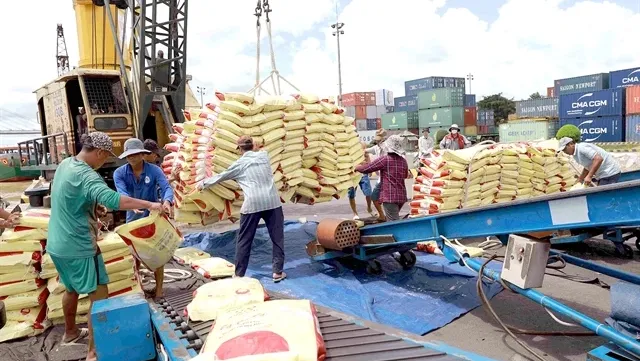Vietnam likely earn 5 billion USD from rice exports this year

Vietnam exported 6.16 million tonnes of rice in the first eight months of this year, up 5.9% over the same period last year, the Ministry of Agriculture and Rural Development (MARD) has said.
Revenue from rice exports reached nearly 3.85 billion USD, a year-on-year growth of 21.7%.
According to the MARD, along with the increase in export volume, the average rice export price in the period also rose about 14.8%, reaching 625 USD per tonne.
In the domestic market, prices of many types of rice in the Mekong Delta region remained stable last week compared to the previous week.
Director of the Crop Production Department under MARD, Nguyen Nhu Cuong, was quoted by the Cong thuong (Industry and Trade) newspaper as saying that the supply of some rice exporting countries now is limited. Both rice export volume and value have increased because the quality of Vietnamese rice is increasingly improved to meet the demanding needs of the world market. Local businesses have also achieved success in rice export negotiations with partners.
Regarding the rice export market in the remaining months of 2024, Cuong said that the demand for rice imports from traditional customers of Vietnam such as the Philippines, Indonesia, Malaysia, will continue to remain high.
Vietnam's rice exporting enterprises are now also expanding into new markets, like the Middle East, Africa, South America, Japan and the Republic of Korea.
Therefore, the total rice export in 2024 is forecasted to reach about eight million tonnes.
MARD Deputy Minister Phung Duc Tien said Vietnam's rice growing area has decreased to 7.12 million hectares, but the export output continues to grow thanks to new rice varieties with higher yield and quality.
With the increasing demand, Vietnam is expected to earn more than 5 billion USD this year from rice, a new record.
Meanwhile, while companies are forecasting that exports will continue to be strong for the remaining months of the year, according to experts, the global rice trade market in 2024 still faces many challenges. These include a decrease in global rice supply due to the continued impacts from rice export bans of some countries (India, the UAE and Russia), climate change and the complicated geopolitical situation in many regions.
To develop the rice export market, the Import-Export Department under Ministry of Industry and Trade, said that it will continue to implement flexible trade promotion activities to strengthen exports with Vietnam's traditional markets, such as Indonesia, Africa and China, while exploiting existing niche markets with fragrant and high-quality rice, including the EU, the Republic of Korea, the US and North American countries.
In addition, it will maintain market information channels via Vietnam trade offices abroad to closely follow developments in the world market situation, especially in major markets.
It will promptly propose measures to respond to unusual developments and promote rice exports. At the same time, it will coordinate with diplomatic missions and trade representative agencies abroad to continue supporting businesses in promoting rice exports.
Tags:





